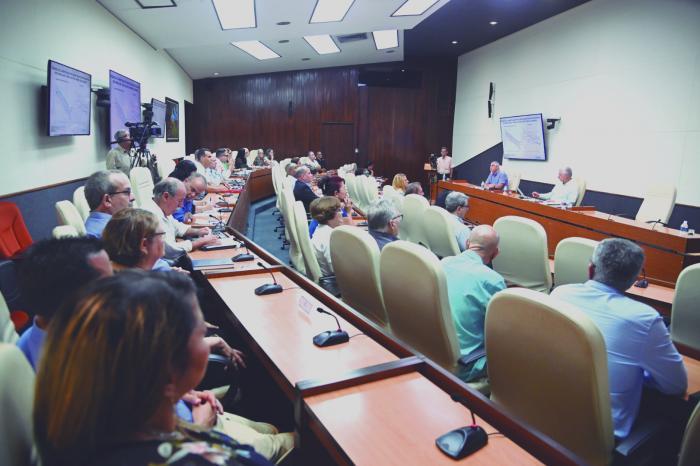
First Secretary of the Central Committee of the Party and President of the Republic Miguel Díaz-Canel Bermúdez headed yesterday a working meeting with health experts and scientists, in which the progress of the Integral Program for Cancer Control was presented.
Although economic shortages affecting the development of the health sector - caused by the effects of the economic, commercial and financial blockade imposed by U.S. government - have prevented Cuba from allocating to this program all the material resources, supplies and medicines it requires, the country continues to look for alternatives to maintain actions at the three levels of care of the National Health System.
Dr. Luis Eduardo Martín Rodríguez, Director of the National Institute of Oncology and Radiobiology, described the approach to cancer in Cuba as a complex problem, which requires multifactorial work, not only from the different structures of Public Health, but also from many others, including the government and the industry.
After a brief account of the impact of that disease in the world, which affects millions of people, Martin Rodríguez said that in Cuba, 60% of the patients live in the provinces of Havana, Matanzas, Villa Clara, Camagüey, Holguín and Santiago de Cuba.
Since the early years of the Revolution, several actions have been carried out to develop and strengthen strategies for the prevention, control and fight against a disease that is currently the second leading cause of death among the Cuban population.
In addition to the Integral Program for Cancer Control, which has allowed a better organization at all levels of care of the National Health System, he highlighted as a strength the existence of a National Oncology Network, made up of specialized hospitals, oncology units, oncology services in provincial hospitals, Radiotherapy departments and Oncopediatric care services.
Referring to the actions that are being carried out, he highlighted those associated with prevention, early detection, diagnosis and treatment, as well as palliative care, all of which are essential for the control of the disease, in the midst of enormous complexities of material resources, including the availability of oncological drugs.
For the National Health System, he assured, increasing the survival of patients with this disease is and will continue to be a priority, and their care is provided by multidisciplinary teams of specialists, which allows for a comprehensive evaluation and treatment of each one of them.
Even though not all solutions are at hand for relief, the Ministry of Public Health has not ceased to promote alliances with the biopharmaceutical industry and the Ministry of Science, Technology and Environment (Citma) in the search for sovereignty and sustainability in the supply and production of medicines.
According to the explanation of Mailín Beltrán Delgado, Head of the Department of Pharmaceutical and Optical Services of the Ministry of Public Health, multiple actions are being carried out in order to continue to overcome obstacles in the treatment of the disease, despite the blockade.
As part of these actions, and the financing that is being allocated, Deputy Prime Minister Eduardo Martínez Díaz commented on the acquisition, by BioCuBafarma, of new equipment for the production of cytostatics, which will increase the availability of these medicines.
President Díaz-Canel insisted on the importance of continuing to develop science and innovation in all processes related to oncology.
In this regard, Dr. Ileana Morales Suárez, Director of Science and Technological Innovation of the Ministry of Public Health, stressed that this is a priority issue for the sector, on which there is solid research and several clinical trials.
In that regard, Dr. Ileana Morales Suarez, Director of Science and Technological Innovation of the Ministry of Public Health, stressed that this is a priority issue for the sector, on which there is solid research and several clinical trials.
Among other developments in Cuban science, Dr. Carlos Alberto Martínez Blanco, head of the Cancer Control Section of the Ministry of Public Health, talked about the production of the Cuban vaccine against the human papillomavirus, the main cause of cervical cancer, on which important steps have been taken.















